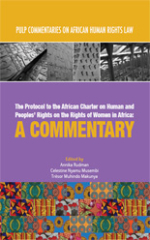The Protocol to the African Charter on Human and Peoples’ Rights on the Rights of Women in Africa: a commentary

The Protocol to the African Charter on Human and Peoples’ Rights on the Rights of Women in Africa: a commentary
The first in a series of PULP commentaries on African human rights law, under the series title: PULP Commentaries on African human rights law
Edited by Annika Rudman, Celestine Nyamu Musembi & Trésor Muhindo Makunya
2023
ISBN: 978-1-7764117-8-8
Pages: 641
Print version: Available
Electronic version: Free PDF available
| File Size: | 7.55 MB |
| File Type: | application/pdf |
| Hits: | 4946 Hits |